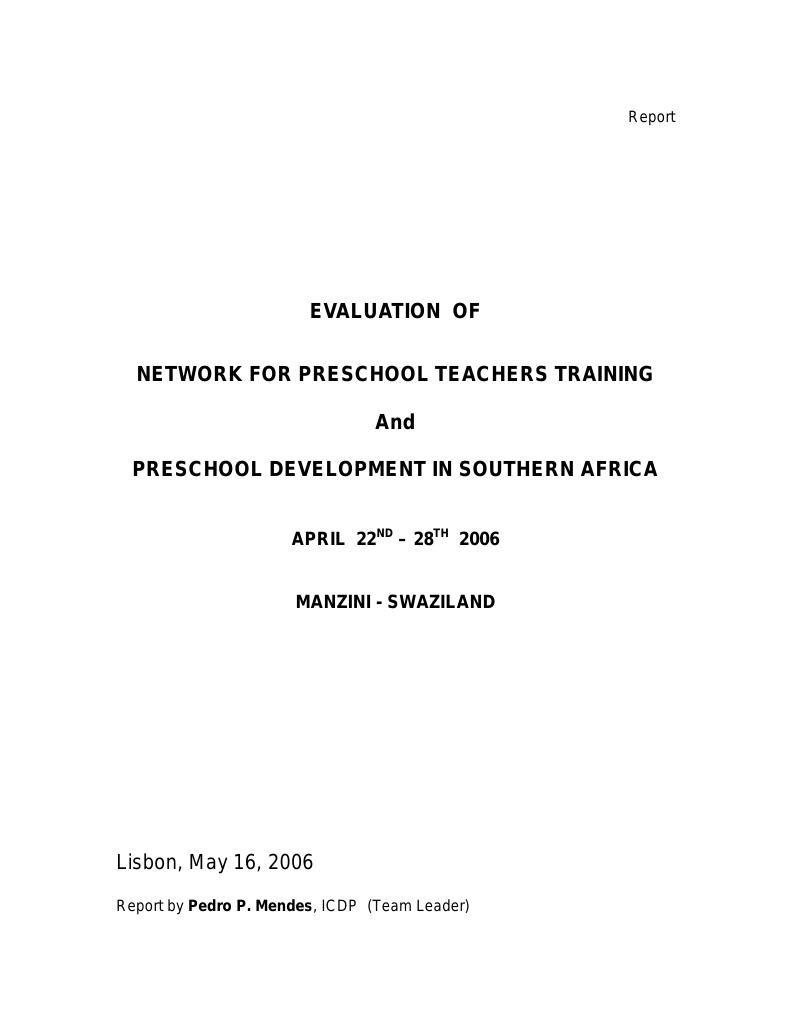Evaluering
Evaluation of network for preschool teachers training and preschool development in Southern Africa
Background Evaluation by Pentecostal Foreign Mission of Norway, Swaziland. The Network for Preschool Teachers Training and Preschool Development in Southern Africa started in 1999. The Network is an informal institution that results from the free association of organizations in 7 countries - Norway, Namibia, Zambia, Swaziland, Botswana, Mozambique and Tanzania. The partner members in Southern African are denominational or lay institutions registered according to their status or informally accepted by the national authorities. The main aim of the network is to collect, share, further develop and spread knowledge, experience and skills in Early Childhood Education in order to create a solid foundation for Preschool Teacher Training in the region. Purpose/objective The Network's present external evaluation was requested aiming at seeing whether it reaches its goal of capacity building within ECE in Southern Africa, analyze and make a balance of activities and how they contribute to the main goal, whether they can be increased, reduced or changed in order to be more effective, and eventually suggest possible steps as to the future of the project. Methodology The methodology used for the evaluation was empirical and based on document review and interviews, participation in some of the Conference sessions. Key findings • The network fulfils its main purpose that is to promote Preschool education amongst the affiliate member countries in the southern region of Africa, in general, achieving its main goal, which is to collect, develop and spread knowledge and experience in Early Childhood Education through a set of actions, as stated in the project's proposal.• It is highly relevant because it gives an answer to existing needs in the affiliate country institutions, namely, upgrading professional expertise in the field of preschool education and recognized by countries' authoritiesIt has produced side effects that enhance the impact of the network.• It is culturally acceptable and relevant because it reactivates and gives a practical use to traditional cultural models in child education;• It has had a significant and positive influence in people involved in the different activities, e.g., more self-confidence and esteem, more flexibility of mind;• The Network is considered an important means of understanding other country's people and culture and as such an important personal and collective challenge. This was clearly stated by all present at the annual conference and seems to have produced a significant impact, particularly, amongst the Norwegian staff and students in terms of life experience and feelings;• The Network is a participatory forum shared by all stakeholders, since the themes for the following year are proposed, discussed and agreed upon in the conference and the participating organizations propose staff and students to the North South exchange; discussions are open and in equal grounds;• An increase in the number both of Network country members and organizations in the region from 1999 to 2006 - 3 countries and organizations to 6 countries and 8 organizations - shows the regional interest in the Network; also activities increased, namely staff and student exchange; opportunities of Master studies, Web-site, research initiatives;• However the Network has a quite clear divide between the organization systems and structure and the activities implemented to reach the goals set. In other words the organization systems and structure need to be strengthened in order to give stability to the current actions and enhance its full potential. Recommendations • The network should continue its work in the Southern African region, because ECE is a new field with great need for capacity building and also because there are more and more children requirering educational attention due to the HIV/AIDS pandemic;• Actions should be taken to give more visibility to the Network in the region in order to help advocate and promote the understanding, acceptance and support of authorities as to ECE and hence also Children's rights and make it a mainstream issue; aiming at this the network should function as a united body and provide indicator measures of the impact and outcome;• The Network needs to put more resources at regional level.
